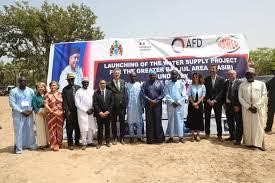The Gambian government, through the Ministry of Petroleum, Energy and Mines, officially launched the Water Supply Project in the Greater Banjul Area (WASIB) over the weekend. This flagship initiative aims to significantly enhance access to clean and sustainable water for nearly one million residents. The launch ceremony, held in Sifoe in the West Coast Region, marked a key milestone in the government’s ongoing efforts to modernize the country’s water infrastructure and address long-standing challenges of water scarcity and quality in urban and peri-urban communities.
The project, implemented in partnership with the National Water and Electricity Company (NAWEC) and primarily funded by the French Development Agency (Agence Française de Développement, AFD), involves the installation of new boreholes, storage tanks, a state-of-the-art water treatment plant, and the upgrading of over 300,000 kilometers of transmission lines. This represents one of the largest investments in the sector in recent years.
Speaking on behalf of the West Coast Region Governor and the North Bank Region Governor, Mr. Lamin Saidykhan described the WASIB initiative as “truly transformative.” He emphasized that water is not just a basic necessity but also the foundation of health, development, and livelihoods, stating that improved access to clean and reliable water would empower families and secure a better future for generations to come. AFD representative Mahoub Mezovaggi highlighted the increasing pressures that climate change has placed on water resources in Africa and globally. He noted that the project will extend daily water supply from four to at least twelve hours, benefiting approximately 920,000 people in the Greater Banjul Area. He also announced plans for a new water research and analysis unit to be managed by NAWEC to ensure continuous monitoring of water quality.
In his keynote address, President Adama Barrow praised the project as a landmark step toward achieving universal access to clean and safe drinking water. He underscored water’s essential role in supporting health, sanitation, and livelihoods. President Barrow revealed that the €59.1 million investment is made possible through a €29 million grant from the Government of France via AFD, alongside an expected €30.1 million concessional loan from the European Investment Bank. He detailed the multi-faceted approach of the project, which includes extending NAWEC’s water network by approximately 300,000 meters, increasing national water production capacity by 25 percent, and for the first time, tapping into deep water sources located between 400 and 600 meters underground.
The project will construct a new 500-cubic-meter water treatment plant and a 1,200-cubic-meter ground storage tank in Sifoe, commission 14 new boreholes including four deep wells, and expand the distribution network by 100,000 kilometers in new “Greenfield” areas and 200,000 kilometers in existing “Brownfield” zones. Construction is anticipated to begin in 2026 and conclude in 2027.
Looking ahead, the government plans to develop a Water Supply and Sanitation Master Plan to guide investments in Greater Banjul and other regions through 2030 to 2050, ensuring long-term sustainability. President Barrow also acknowledged the vital roles played by international partners—the Governments of France and the European Investment Bank—as well as technical consultants and contractors such as ANTEA France, WATURA, SGI, GAP Consultants, and the RAZEL BEC Consortium. He praised their expertise and dedication as critical to the project’s success.
With water access remaining a critical challenge in The Gambia, the WASIB project represents a bold and necessary step toward addressing infrastructure deficits, improving the quality of life, and ensuring water security for urban populations amid growing environmental and demographic pressures.


















